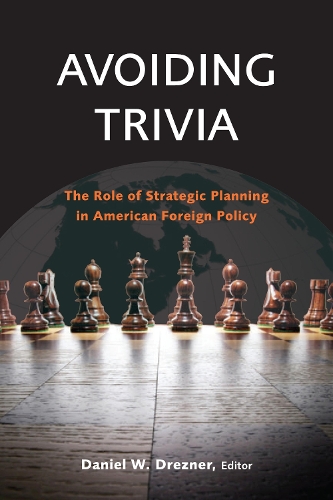
Avoiding Trivia: The Role of Strategic Planning in American Foreign Policy
(Paperback)
Publishing Details
Avoiding Trivia: The Role of Strategic Planning in American Foreign Policy
By (Author) Daniel W. Drezner
Bloomsbury Publishing PLC
Brookings Institution
5th May 2009
United States
Classifications
Professional and Scholarly
Non Fiction
Central / national / federal government
Warfare and defence
327.73
Physical Properties
Paperback
200
Width 154mm, Height 230mm, Spine 14mm
327g
Description
"
After World War II, George Kennan became the State Department's first director of policy planning. Secretary of State George Marshall's initial advice to Kennan: above all, ""avoid trivia."" Concentrate on the forest, not the trees, and don't lost sight of the big picture. Easier said than done. Avoiding Trivia critically assesses the past, future, and future role and impact of long-term strategic planning in foreign policy.
Strategic planning needs to be a more integral part of America's foreign policymaking. Thousands of troops are engaged in combat while homeland security concerns remain. In such an environment, long-term coordination of goals and resources would seem to be of paramount importance. But history tells us that such cohesiveness and coherence are tremendously difficult to establish, much less maintain. Can policy plannersin the Pentagon, the State Department, Treasury, NSC, and National Intelligence Councilrise to the challenge Indeed, is strategic planning a viable concept in 21st century foreign policy These crucial questions guide this eye-opening book.
The contributors include key figures from the past few decades of foreign policy and planningindividuals responsible for imposing some sort of order and strategic priority on foreign policy in a world that changes by the minute. They provide authoritative insight on the difficulties and importance of thinking and acting in a coherent way, for the long term.
Contributors: Andrew P. N. Erdmann, Peter Feaver, Aaron L. Friedberg, David F. Gordon, Richard N. Haass, William Inboden, Bruce W. Jentleson, Steven D. Krasner, Jeffrey W. Legro, Daniel Twining, Thomas Wright, Amy B. Zegart.
"Reviews
Author Bio
Daniel Drezner is a professor of international politics at Tufts University. His previous books inlcude All Politics is Global: Explaining International Regulatory Regimes (Princeton, 2007) and The Sanctions Paradox (Cambridge, 1999). He is also the author of a popular blog on politics and foreign policy (drezner.foreignpolicy.com).
